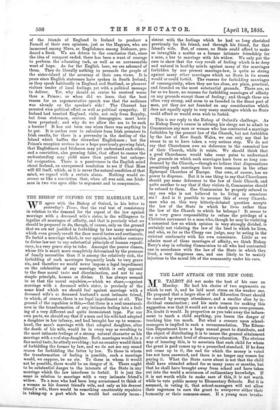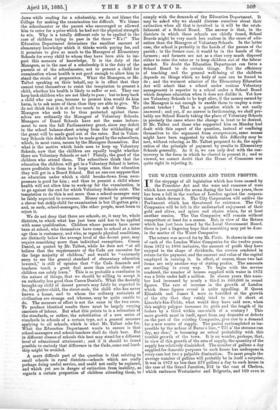THE LAST ATTACK ON THE NEW CODE.
MR. TALBOT did not make the best of his case on Monday. Ho had his choice of two arguments on which to rest it, and he laid most stress on the weaker one. He proposed that a larger slice of the Education Grant should be earned by average attendance, and a smaller slice by individual examination ; and his main reason for making this suggestion was that it would act as a check upon over-pressure. No doubt it would. In proportion as you take away the inducement to teach a child anything, you lessen the danger of teaching him too much. But what a censure upon schoolmanagers is implied in such a recommendation. The Education Department have a large annual grant to distribute, and the object of distributing it is to insure the general attainment of a certain modest level of elementary education. The obvious way of insuring this, is to ascertain that each child for whom the grant is paid comes up to a prescribed standard. If he does not come up to it, the end for which the money is voted has not been answered, and there is no longer any reason for paying it. What the State cares about is not that the child shall have attended school for so many years or months, but that he shall have brought away from school and have taken out into the world a minimum of rudimentary knowledge. If it is not worth while to make sure of this, it is not worth while to vote public money to Elementary Schools. But it is assumed, in voting it, that school-managers will not allow their eagerness to earn the grant to overpower either their humanity or their common-sense. If a young man breaks
down while reading for a scholarship, we do not blame the College for making the examination too difficult. We blame the schoolmaster or the parent who encouraged or allowed him to enter for a prize which he had not the physical strength to win. Why is a totally different rule to be applied in the case of children trying to pass in the three " R's ?" The Education Department determines the smallest amount of elementary knowledge which it thinks worth paying for, and it promises to give so much to the Managers of Elementary Schools for every child to whom they have been able to impart this measure of knowledge. It is the duty of the Managers, as in the case of a scholarship it is the duty of the parents or of the schoolmaster, not to present a child for examination whose health is not good enough to allow him to stand the strain of preparation. What the Managers, or Mr. Talbot speaking on their behalf, say is in effect that they cannot trust themselves to resist the temptation to present a child, whether his health is likely to suffer or not. They can keep back children who are not likely to pass ; but to keep back a child who can pass, because to present him would do him harm, is to ask more of them than they are able to give. We do not think that it is at all too much to ask of them. The Managers who seek to be thus protected against themselves are ordinarily the Managers of Voluntary Schools. Managers of Board Schools have not the same inducement to earn the full Parliamentary grant, since any deficit in the school balance-sheet arising from the withholding of the grant will be made good out of the rates. But in Voluntary Schools this deficit has to be made good by the subscribers, which, in most cases, means by the Managers themselves. But what is the motive which leads men to keep up Voluntary Schools, now that the children are equally taught whether there are Voluntary Schools or. not ? Plainly, the good of the children who attend them. The subscribers think that the education the children will get in a Voluntary School is better, more profitable to them in a large sense, than the education they will get in a Board School. But no one can suppose that an education under which a child breaks-down from overpressure is good for him ; and thus to present a child whose health will not allow him to work-up for the examination, is to go against the end for which Voluntary Schools exist. The temptation to do this is not more than a school-manager may be fairly expected to overcome. Money earned by presenting a clever but sickly child for examination is but ill-gotten gain ; and, as such, school-managers, like other people, must learn to reject it.
We do not deny that there are schools, or, it may be, whole districts, to which what has just been said has to be applied with some qualification. Children whose parents have never been at school, who themselves have come to school at a later age than is customary, and who, as regards physical conditions, are distinctly below the average level of the decent poor, may require something more than individual exemptions. Canon Daniel, as quoted by Mr. Talbot, while he does not " at all believe that the requirements of the Code are excessive for the large majority of children," and would be " extremely sorry to see the general standard of elementary education lowered," is still of opinion that " the Code demands and teachers teach a great deal more than certain classes of children can safely learn." This is so probable a conclusion in the nature of things, that we should be willing to accept it on authority less good than Canon Daniel's. What the decently brought-up child of decent parents may fairly be expected to do, the gutter-child, the street-arab, the child who has never known a home, and to whom the ordinary restraints of civilisation are strange and irksome, may be quite unable to do. The measure of effort is not the same in the two cases. To produce identical results there must be largely varying amounts of labour. But what this points to is a relaxation of the standards, or rather, the substitution of a new series of standards in schools of a certain type, not a general measure applying to all schools, which is what Mr. Talbot asks for. What the Education Department wants to ensure is that school-managers and school-teachers shall do their best. But in different classes of schools this best may stand for a different level of educational attainment ; and if it should be found possible to embody that difference in the Code, some real hardship might be avoided.
A more difficult part of the question is that relating to small schools in rural districts—schools which are really perhaps doing useful service, and could not easily be replaced, and which yet are in danger of extinction from inability, as regards a certain proportion of children attending them, to
comply with the demands of the Education Department. It may be asked why we should distress ourselves about their extinction when all that is involved in it will be the establishment of a School Board. The answer is that, in the districts in which these schools are chiefly found, School Boards might be very much less zealous in the cause of education than the Managers of Voluntary Schools. In the latter case, the school is probably in the hands of the parson of the parish ; in the former case, it would be in the hands of the farmers ; and farmers are not as a class very much disposed either to raise the rates or to keep children out of the labour market. No doubt the Education Department cab force a School Board to do certain things. But the efficiency of teaching and the general well-being of the children depends on things which no body of men can be forced to do ; and the warmest admirer of the Elementary Education Act will admit that a school under zealous Voluntary management is superior to a school under a School Board which despises education when it does not dislike it. Yet how are Voluntary Schools to be kept alive, if the money earned by the Managers is not enough to enable them to employ a competent teacher ? That is a question which is not easily answered ; and yet, if no answer is forthcoming, we shall probably see School Boards taking the place of Voluntary Schools in precisely the cases where the change is least to be desired. If Mr. Talbot and those who supported him on Monday had dealt with this aspect of the question, instead of confining themselves to the argument from overpressure, some means might have been suggested by which this difficulty may be met, without relaxing, as Mr. Talbot proposed to do, the application of the principle of payment by results to Elementary Schools generally. As it is, we can only deal with the controversy in the form in which he elected to present it ; and so viewed, we cannot doubt that the House of Commons was quite right in rejecting it.



































 Previous page
Previous page